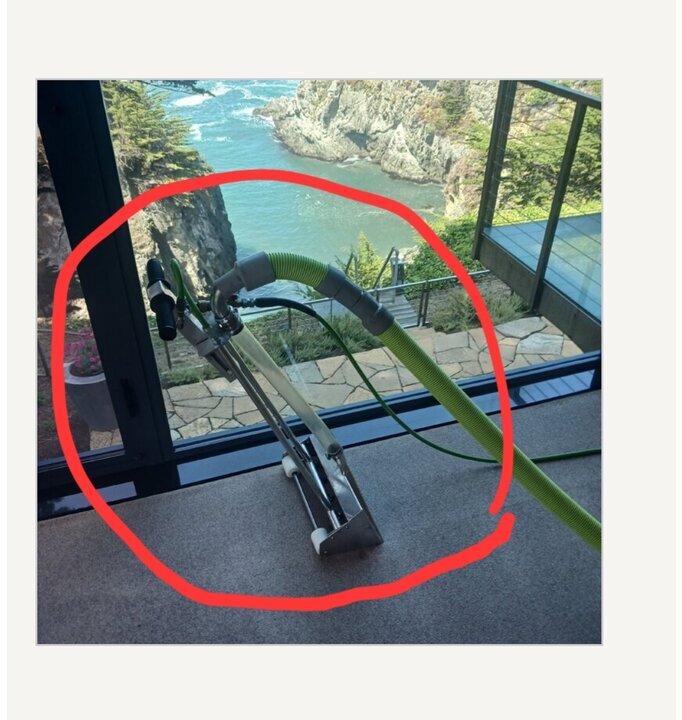You are using an out of date browser. It may not display this or other websites correctly.
You should upgrade or use an alternative browser.
You should upgrade or use an alternative browser.
HydroClean Truckmounts
- Thread starter Gtplayer
- Start date
When motorcycles first started being liquid cooled manufacturers would put um in a stall in the Mojave Desert in the summer time and let them idle for hours monitoring to make sure the cooling systems were adequate and work properly. This is for a motorcycle so imagine how much similar testing went into cars. As for catalytic converters they have up and down stream o2 sensors and intake has map sensor sending data to the ecm adjusting fuel trims/ timing/ cam angle /spark/spark duration/ etc etc etc hundreds of times a second. Ive been driving now for more than 1/2 a century and in that amount of time ive replaced exactly 1 catalytic converter on all the vehicles that ive ever owned. I personally think that cleaners have more pressing problems to worry about than there van idling in the driveway while they move a couple of pieces of furniture. As far as oil go change it every 5000 miles or when ever the van tells you to and you should be fine i know i amI agree the manufacturers have an agenda to push.
Idling creates higher emissions per rev. Im not sure vehicles still have them or not but EGR valves and cat converters plug up faster from idling too.
The service vehicles you mentioned do get serviced more frequently due to the idling. I think the oil changes are every 1500 miles instead of 3000.
If you had vehicles that idle a lot you might remember replacing batteries and alternators and wondering what killed them
When people started putting amps in their cars they started killing their charging systems too. Now they use multiple batteries and two bigger alternators to prevent the damage.
Your coolant pump doesn't pump efficiently at idle. Think of how cars would die on highways when they came to a stop. The motor was still hot but couldn't cool it fast enough because of tge pump doesn't circulate it fast enough. Its not just the numbers like thermostats kicking in at at a certain temp.
Just because it kicks in at 210 doesn't mean the engines temp is 210. Numbers are deceptive. Or as I say numbers lie.
You know back in the 60s American cars lasted maybe 100k and European cars lasted 2-300k do you know what that was attributed to??European cars had Atomized fuel from Port fuel injection . American cars had carburetors and carburetors had accelerator pumps. Accelerator pumps put liquid fuel into cylinders and wore out engines atomized fuel did notAtomized fuel is still a liquid.
Not sure why you said it wasnt.
Bryce C
DFW
- Joined
- Feb 9, 2024
- Messages
- 1,247
- Name
- Bryce
250 amps
Do you mean it has a 250 amp alternator? Tell us what the actual amperage output at idle is. 250 amp alternators put out around 125 amps at idle, and your vehicle is consuming about 50 of those amps while running........
I have a friend that several years ago i got into a heated argument with about oil change intervals he would change his oil every 3000 miles and he said it was better for the car. My stance was he was wasting his money and shiuld change oil every 5000. Well he moved away and a few years later i got a call outa the blue from him. He asked if I remembered that argument i said yes he said that he had just bought a 750BMW and got the extended service package and the manufacturer and dealer would only change the oil every 7000 miles or once a year. He just thought id like to knowI agree the manufacturers have an agenda to push.
Idling creates higher emissions per rev. Im not sure vehicles still have them or not but EGR valves and cat converters plug up faster from idling too.
The service vehicles you mentioned do get serviced more frequently due to the idling. I think the oil changes are every 1500 miles instead of 3000.
If you had vehicles that idle a lot you might remember replacing batteries and alternators and wondering what killed them
When people started putting amps in their cars they started killing their charging systems too. Now they use multiple batteries and two bigger alternators to prevent the damage.
Your coolant pump doesn't pump efficiently at idle. Think of how cars would die on highways when they came to a stop. The motor was still hot but couldn't cool it fast enough because of tge pump doesn't circulate it fast enough. Its not just the numbers like thermostats kicking in at at a certain temp.
Just because it kicks in at 210 doesn't mean the engines temp is 210. Numbers are deceptive. Or as I say numbers lie.
I understand what the computers and sensors do. They go bad often enough too.When motorcycles first started being liquid cooled manufacturers would put um in a stall in the Mojave Desert in the summer time and let them idle for hours monitoring to make sure the cooling systems were adequate and work properly. This is for a motorcycle so imagine how much similar testing went into cars. As for catalytic converters they have up and down stream o2 sensors and intake has map sensor sending data to the ecm adjusting fuel trims/ timing/ cam angle /spark/spark duration/ etc etc etc hundreds of times a second. Ive been driving now for more than 1/2 a century and in that amount of time ive replaced exactly 1 catalytic converter on all the vehicles that ive ever owned. I personally think that cleaners have more pressing problems to worry about than there van idling in the driveway while they move a couple of pieces of furniture. As far as oil go change it every 5000 miles or when ever the van tells you to and you should be fine i know i am
None of that makes idling ok.
The extra oil changes alone eat up much of the savings and it offers lower performance regardless of the numbers touted.
Might as well drag a party into the house for real savings. Or a buffer and get even better dry times.
Just my take on it. I could be wrong.
What woukd the customer think if they knew it runs off the vans battery? They seem pretty impressed that mine runs of a v8. And I ran a bane for too long so I have experience with upgrading. I want the best performance for the work I have to put in. The extra five bucks a job is easily recovered from the customer and I dont have to work as hard to do a better job.
Bryce C
DFW
- Joined
- Feb 9, 2024
- Messages
- 1,247
- Name
- Bryce
I have a friend that several years ago i got into a heated argument with about oil change intervals he would change his oil every 3000 miles and he said it was better for the car. My stance was he was wasting his money and shiuld change oil every 5000. Well he moved away and a few years later i got a call outa the blue from him. He asked if I remembered that argument i said yes he said that he had just bought a 750BMW and got the extended service package and the manufacturer and dealer would only change the oil every 7000 miles or once a year. He just thought id like to know
I'm always concerned when I see motor oil getting significantly darker. If it is high quality synthetic oil and you're only 3k in since the last oil change but the oil is quite dark compared to new... still fine to wait until 5k to change it?
Why are you so hung up on a huge alternator??? You gunna power up the hoDo you mean it has a 250 amp alternator? Tell us what the actual amperage output at idle is. 250 amp alternators put out around 125 amps at idle, and your vehicle is consuming about 50 of those amps while running........
View attachment 132078
View attachment 132079
I'm always concerned when I see motor oil getting significantly darker. If it is high quality synthetic oil and you're only 3k in since the last oil change but the oil is quite dark compared to new... still fine to wait until 5k to change it?
Oil changes color partly as a chemical reaction to the detergents and additives working more than being dirtyI'm always concerned when I see motor oil getting significantly darker. If it is high quality synthetic oil and you're only 3k in since the last oil change but the oil is quite dark compared to new... still fine to wait until 5k to change it?
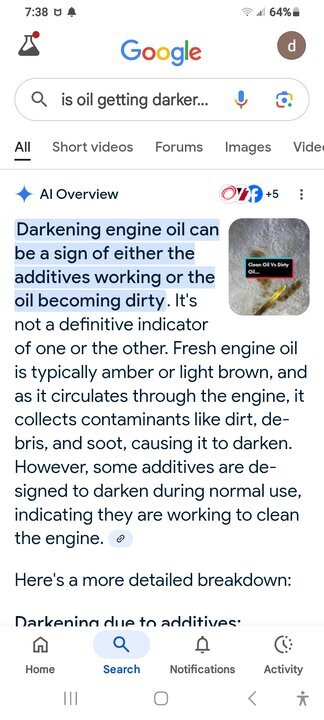
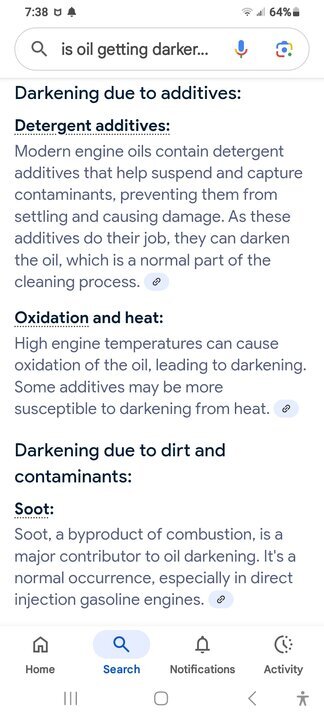
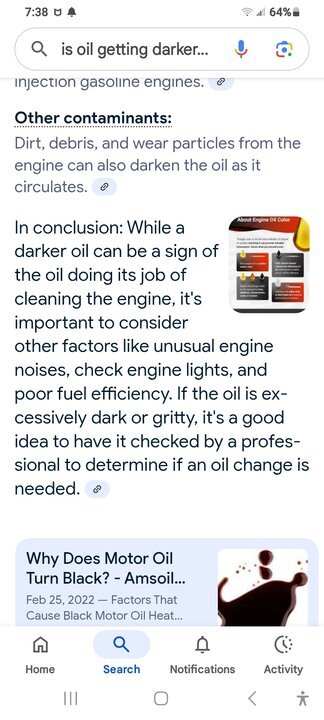
Bryce C
DFW
- Joined
- Feb 9, 2024
- Messages
- 1,247
- Name
- Bryce
Why are you so hung up on a huge alternator??? You gunna power up the ho
Regarding this Hydroclean electric tm? If he's not running a generator, or plugging into shore power from a home or business.. the power to run electric vacuums, pumps, and more has to come from somewhere.
Bryce C
DFW
- Joined
- Feb 9, 2024
- Messages
- 1,247
- Name
- Bryce
A 400 amp alternator with a small pulley will you give you the most rotations and output at idle. With a small pulley that could produce about 250 amps at idle, and produce about the same vacuum and psi of my Hydramaster PEX 500 portable. But then 120 feet of vacuum line creates a loss.
Unless I missed something he is planning on powering the vacuum and pressure from the van, electrically.
Unless I missed something he is planning on powering the vacuum and pressure from the van, electrically.
I don't know anything about that machine except what the information sheet says and it says it requires 2-15a home circuits in addition to the van so im assuming that its a portable mounted in a van and possibly using some sort of a heat exchangerRegarding this Hydroclean electric tm? If he's not running a generator, or plugging into shore power from a home or business.. the power to run electric vacuums, pumps, and more has to come from somewhere.
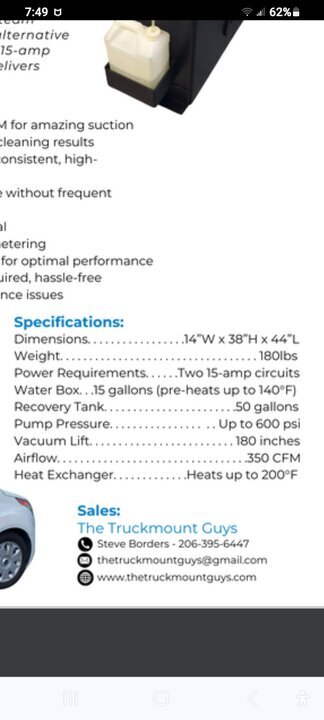
Do they use synthetic?I have a friend that several years ago i got into a heated argument with about oil change intervals he would change his oil every 3000 miles and he said it was better for the car. My stance was he was wasting his money and shiuld change oil every 5000. Well he moved away and a few years later i got a call outa the blue from him. He asked if I remembered that argument i said yes he said that he had just bought a 750BMW and got the extended service package and the manufacturer and dealer would only change the oil every 7000 miles or once a year. He just thought id like to know
I had a little 3 cylinder metro I drove to Chicago from Michigan every day. I changed the oil every 3000 miles and the oil always looked new.
Once I quite that job and drove it less the oil looked dirty at 3000 miles.
The detergents still broke down highway driving but was filtered better due to the higher rpm average.
Those idling vehicles still get oil changes twice as often to protect the motor.
A vehicle being driven at higher RPMs will always last longer than one that idles frequently.
They are made to be driven not sit idling.
But sitting idling creates less heat under the hood so other parts may not wear as fast neither.
.
Bryce C
DFW
- Joined
- Feb 9, 2024
- Messages
- 1,247
- Name
- Bryce
I don't know anything about that machine except what the information sheet says and it says it requires 2-15a home circuits in addition to the van so im assuming that its a portable mounted in a van and possibly using some sort of a heat exchanger
View attachment 132083
Oh yea good call.
I have no idea what you're talking about im assuming this was a modern engine?? meaning made after 1965 or so?? and if so has a full flow oil filtering system , meaning all the oil is pumped from the sump thru the filter not some or most and delivered to the engine regardless of the rpms correct?? Earlier engines sometimes had partial flow oil filtering systems where only some of the oil was filtered but modern engines filter 100% of the oil before delivering to the engine. Now we can argue the internal bypass valve in all oil filters if thats the way you want to go down that rabbit hole. but under normal conditions all oil is filtered before before delivered to the engimeDo they use synthetic?
I had a little 3 cylinder metro I drove to Chicago from Michigan every day. I changed the oil every 3000 miles and the oil always looked new.
Once I quite that job and drove it less the oil looked dirty at 3000 miles.
The detergents still broke down highway driving but was filtered better due to the higher rpm average.
Those idling vehicles still get oil changes twice as often to protect the motor.
A vehicle being driven at higher RPMs will always last longer than one that idles frequently.
They are made to be driven not sit idling.
But sitting idling creates less heat under the hood so other parts may not wear as fast neither.
.
As far as oil change intervals on pto's i use mobil1 extended milage oit and filter the oil says good for 15k the computer in my van tells me its time to change at around 3500-4k i change it when the computer says. I monitor every morning before i get into the van i check oil, coolant,power steering, brake fluid i get into the van start engine check the computer for fuel used since last filled, tire pressure all 4 and oil life left this morning it was 49%. Now my new toyota says oil change intervals are 10k under normal use and 7k heavy use and towing it gets changed every 5k with mobil1 extended 0-20wt yes cap calls for 0-20 and manual says if you can't find 0-20 use 5-20 but must go back to 0-20 next changeDo they use synthetic?
I had a little 3 cylinder metro I drove to Chicago from Michigan every day. I changed the oil every 3000 miles and the oil always looked new.
Once I quite that job and drove it less the oil looked dirty at 3000 miles.
The detergents still broke down highway driving but was filtered better due to the higher rpm average.
Those idling vehicles still get oil changes twice as often to protect the motor.
A vehicle being driven at higher RPMs will always last longer than one that idles frequently.
They are made to be driven not sit idling.
But sitting idling creates less heat under the hood so other parts may not wear as fast neither.
.
MarkieMark
Member
- Joined
- Apr 4, 2024
- Messages
- 135
- Name
- Mark Franco
If it's a 24" i would be interested in buying it. I use a 16" normally and i have several. I have a 12" for for area rugs and5th wheel trailers and tiny houses. Ive been looking for a 24" for commercial jobs but they've proven to be elusiveI used to ride on the front to get some weight on it for my father for floodwork. Seemed to work great though he had a 45lb donut weight if I wasn't there. I was a lightweight kid but I am sure I was at least 100 lbs. Still has it in his back yard on the side of the house I think.
View attachment 132085
Manufacturer's recommendation for minor service (which included oil change) on one of our vehicles was 20,000 miles. On our European and Asian vehicles we run at 20,000 Km (about 12,000 miles). We have been doing these service intervals for many years on both diesel and petrol motors.I have a friend that several years ago i got into a heated argument with about oil change intervals he would change his oil every 3000 miles and he said it was better for the car. My stance was he was wasting his money and shiuld change oil every 5000. Well he moved away and a few years later i got a call outa the blue from him. He asked if I remembered that argument i said yes he said that he had just bought a 750BMW and got the extended service package and the manufacturer and dealer would only change the oil every 7000 miles or once a year. He just thought id like to know
BIG WOOD
The Timminator
- Joined
- Feb 4, 2016
- Messages
- 14,588
- Name
- Matt w.
I was thinking the exact same thingI venture to guess that there are no markets in America that can guarantee you that you’ll be asked to clean only “nice” homes with clean carpet. I’ve seen Mikey comment on a few dirty situations over the years. Why limit yourself in what you can clean, unless this business is just a hobby to you?
Having just said that, I’m thinking the actual cleaning side actually IS just a hobby for Mikey now.
It’s just an excuse to allow underpowered machines like the 370 stay on the floor at the dealers to create a system of always needing to “upgrade” your machine. It just helps the dealers, not the end user.
What I'm saying is engines stay cleaner when they are run at higher rpm than idle. The difference between highway miles and city miles.I have no idea what you're talking about im assuming this was a modern engine?? meaning made after 1965 or so?? and if so has a full flow oil filtering system , meaning all the oil is pumped from the sump thru the filter not some or most and delivered to the engine regardless of the rpms correct?? Earlier engines sometimes had partial flow oil filtering systems where only some of the oil was filtered but modern engines filter 100% of the oil before delivering to the engine. Now we can argue the internal bypass valve in all oil filters if thats the way you want to go down that rabbit hole. but under normal conditions all oil is filtered before before delivered to the engime
And motor oil has detergents that break down over time. Synthetic last longer too but cost more upfront.
My neighbor thought I was nuts too for changing it so often but that engine was clean until I stopped driving all the highway miles.
Idling is not good for engines.
Mikey P
Administrator
- Joined
- Oct 6, 2006
- Messages
- 117,153
I was thinking the exact same thing
It’s just an excuse to allow underpowered machines like the 370 stay on the floor at the dealers to create a system of always needing to “upgrade” your machine. It just helps the dealers, not the end user.
Rather than upgrade your machine, why don't you consider upgrading your client base...
Excuses.Rather than upgrade your machine, why don't you consider upgrading your client base...
But he says he has 4 or 5 newer machines now they are running and 2 of the electric they are running. His fuel bill is 4 grand a month and he is using these machines to replace the CDS's.I believe you're looking at this backwards, the machine in question will clean nice homes where people respect and take care of their floors at very low cost low noise low fuel consumption and at some point in your career it'll be all you need..
Which is it? Are these for retired cleaners or for daily use for a busy cleaner.
I really should stop reading so much. I just see things that bug me and can't let go until it makes sense.
He should stick to selling his machine and not put others down in the process. Especially the ones that made him successful.
BIG WOOD
The Timminator
- Joined
- Feb 4, 2016
- Messages
- 14,588
- Name
- Matt w.
-"Thank you for calling Currahee Cleaning Services. How can I help you today?"Rather than upgrade your machine, why don't you consider upgrading your client base...
-Customer: "I have 3 rooms of carpet that need cleaned."
-"Oh Great! Let me pull up my schedule and see when I can get you scheduled. I have one question...How dirty is your carpet?"
-Customer: "I just had a baby and my puppy has been tinkling all over the carpet and my husband's muddy boots keeps tracking in. I want to get the carpet as clean as possible before he starts crawling"
- "Oh, I'm sorry, I don't clean heavily soiled carpet. You'll need to call a business with a machine that can handle the heavy flushing" "have a good day"
Chavez once mentioned a swing arm on a slide in to extend the motor outside the van like some blow in insulation trucks have.I'd be out of business a long, long time ago if I didn't keep an open mind.
I've discontinued one line of products we've had for nearly 30 years yesterday. I'm meeting with a new potential vendor on the equipment end today. Our world is changing faster than we know, and I try to avoid the "set in my ways old man" tendency that easily befalls us all.
Bane Clene had a very long run of success with an electric concept. Its end wasn't, in my view, because the idea didn't work. It was because they stayed, for the most part, with 1970s technology....maybe 1980s if I want to be generous.
We sold the Castex Cyclomatic and the Workmaster in the 80s. They were good, but not great, machines. I also looked at an existing electric truck mount. When powered properly, and if one could overlook the octopus of powercords, it performed surprisingly well.
But there were limitations and issues that made it unattractive to us.
I would like to see this unit in the field, what the set up and actual energy demands are like, before making any judgment.
Our industry is surely ready for some innovation and new ideas.
It would keep tge machine and van cooler and make maintenance so much easier.
We could build a sliding frame that you could bolt to the vehicle frame and the whole set up could bolt on that outside the van then be slid into the van when not in use.
Leave it out until everything has cooled. No more hot motor or blower behind you.
I just need and engineer for weight loads.
I would call it The Chavez.
Last edited:
Thats funny.-"Thank you for calling Currahee Cleaning Services. How can I help you today?"
-Customer: "I have 3 rooms of carpet that need cleaned."
-"Oh Great! Let me pull up my schedule and see when I can get you scheduled. I have one question...How dirty is your carpet?"
-Customer: "I just had a baby and my puppy has been tinkling all over the carpet and my husband's muddy boots keeps tracking in. I want to get the carpet as clean as possible before he starts crawling"
- "Oh, I'm sorry, I don't clean heavily soiled carpet. You'll need to call a business with a machine that can handle the heavy flushing" "have a good day"
If you only clean clean carpet I woukd assume work is slow. There woukdnt be much wear and tear on a van or machine then.
Trying to solve a problem that doesn't exist.
Sounds like something designed and build by Rube GoldbergChavez once mentioned a swing arm on a slide in to extend the motor outside the van like some blow in insulation trucks have.
It would keep tge machine and van cooler and make maintenance so much easier.
We could build a sliding frame that you could bolt to the vehicle frame and the whole set up could bolt on that outside the van then be slid into the van when not in use.
Leave it out until everything has cooled. No more hot motor or blower behind you.
I just need and engineer for weight loads.
I would call it The Chavez.

Mikey P
Administrator
- Joined
- Oct 6, 2006
- Messages
- 117,153
Oh, great, sounds like a challenge I can handle, but it will take me an extra 30 minutes to an hour to earn your satisfaction, we here at Currahee Cleaning Services have a "sort of extreme condition surcharge of $XXX, would that be OK with you?-"Thank you for calling Currahee Cleaning Services. How can I help you today?"
-Customer: "I have 3 rooms of carpet that need cleaned."
-"Oh Great! Let me pull up my schedule and see when I can get you scheduled. I have one question...How dirty is your carpet?"
-Customer: "I just had a baby and my puppy has been tinkling all over the carpet and my husband's muddy boots keeps tracking in. I want to get the carpet as clean as possible before he starts crawling"
- "Oh, I'm sorry, I don't clean heavily soiled carpet. You'll need to call a business with a machine that can handle the heavy flushing" "have a good day"
oh and btw, the last time I was out at your place, annoying the neighbors and your baby with my very loud Macho Mega Machine, I took head , after other complaints, and switch to a MUCH lower cost unit to own and maintain, so our prices have actually gone down, so you may not even notice the surcharge.
Last edited:
There is some truth to this. I actually did that without even realizing it… most of my customer base has changed over the last 10 years. Price shoppers don’t even bother anymore!!Rather than upgrade your machine, why don't you consider upgrading your client base...
Latest posts
-
-
-
-
-
-
-
-
Affordable Home Cleaning with Afterpay Carpet Cleaning Services
- Latest: frank fratto
-
-
-
-
-
-

